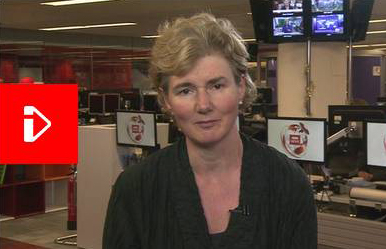GSK to stop paying doctors to make speeches
Editor of the British Medical Journal Fiona Godlee: “Doctors need independent, unbiased information about drugs”
“There is a long way to go if we are truly to extricate medicine from commercial influence” Fiona Godlee Editor, British Medical Journal
GlaxoSmithKline (GSK) is making major changes to its incentive schemes following a damaging corruption scandal in China.
The pharmaceuticals firm will stop paying doctors to promote its products through speaking engagements.
Members of its sales force will also no longer have individual sales targets.
Earlier this year, Chinese police said GSK had transferred 3bn yuan ($489m; £321m) to travel agencies and consultancies to help bribe doctors.
But the company says the latest measures are not related to that continuing investigation. Instead, it says, they are part of a wider effort to improve transparency.
‘Greater clarity’
In a statement, Sir Andrew Witty, chief executive of GSK, said: “Today we are outlining a further set of measures to modernise our relationship with healthcare professionals.
“These are designed to bring greater clarity and confidence that whenever we talk to a doctor, nurse or other prescriber, it is patients’ interests that always come first.”
As well as stopping payments to doctors for making speeches, GSK is also ending payments to healthcare professionals for attending medical conferences.
A spokesperson told the BBC that there were “perceived conflicts of interest with that way of working”.
GSK plans a new system under which independent organisations, such as universities, can approach GSK for a grant if they want a particular doctor to attend a medical conference.
Doctors ‘satisfied’
In a statement, Dr Vivienne Nathanson, head of science and ethics at the British Medical Association (BMA), which represents doctors, said: “Whilst we agree that GSK should not directly sponsor doctors going to meetings, we are satisfied that they will continue to financially support education.
“It is pleasing to see a large pharmaceutical company like GlaxoSmithKline recognise that it can reduce the possibility of undue influence by rewarding employees for providing high-quality information and education for doctors, rather than for their sales figures.”
GSK says sales representatives will be rewarded for “technical knowledge” and the “quality of the service they deliver to support improved patient care”. Their compensation will also be linked to the overall performance of GSK.
Salespeople in the US have already been working under those conditions since 2011.
A spokesperson from GSK said: “It was always our intent to roll it out globally.”
Paying doctors to make speeches and attend conferences is common in the pharmaceuticals industry, but there is growing demand for reform.
“Where GSK leads we must hope that other companies will follow,” Fiona Godlee, editor of the British Medical Journal and a campaigner against industry influence in medicine, told the Reuters news agency.
“But there is a long way to go if we are truly to extricate medicine from commercial influence. Doctors and their societies have been too ready to compromise themselves.”
‘Non-trivial’
Ben Goldacre, author of the book Bad Pharma, is concerned about the quality of advice received by doctors.
He told BBC Radio 4: “Doctors get a lot of their education about which treatment works best from the pharmaceutical industry itself – from doctors who have been paid to give lectures about which drug is best.
“This free education has been shown to be be biased in research and it’s non-trivial.”
Andrew Powrie-Smith, director at the Association of the British Pharmaceutical Industry, told BBC Radio 4: “A number of companies I think are looking at this area and different models of education are emerging.”
He stressed that by 2016 companies would have to disclose how much they pay individual doctors.




